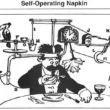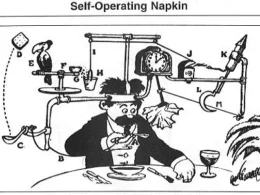Moments after first mention of the word “bailout” came the first of many references to the inevitable outcome: moral hazard, which is the term used to describe the direct correlation between the irresponsibility of one’s behavior and the degree to which one is insulated from responsibility for said behavior.
Moral hazard is observed in any decision-making entity – including individuals, corporations and even government regulatory agencies – and in extreme cases helps to explain many of their otherwise inexplicable actions. Indeed, when attempting to understand much of what happens at the Securities and Exchange Commission (SEC), I believe moral hazard is nearly as important a factor as the much more frequently-discussed matter of regulatory capture.
The following case illustrates this quite aptly.
In his most recent report to Congress, David Kotz, Inspector General of the SEC, summarized an internal report prepared by his office in which two unnamed enforcement attorneys were found to have provided information on non-public SEC investigations to an unnamed short-seller and an FBI agent. It’s apparent that the short-seller and FBI agent are the infamous Anthony Elgindy and Jeffrey Royer, respectively. The identities of the two SEC investigators who enabled them, on the other hand, are not clear.
Hoping to learn more, longtime SEC critic Dave Patch requested and received the IG’s full report on the matter (get your copy here!). Months later, the report arrived, though redacted by SEC censors (not affiliated with the IG’s office) to the point of near incomprehensibility. None the less, thanks to a single missed redaction and extensive cross-referencing of facts mentioned in the report, we’ve established the identities of both SEC employees.
They are: Douglas Gordimer and Robert Long, both senior investigators at the SEC’s Fort Worth regional office. Knowing this, it’s possible to fill in almost all of the holes left by SEC censors, and better understand the enabling role that organization played in the Elgindy/Royer scams.
It all began in March of 2000, when Royer, then a special agent with the FBI’s White Collar Crime Unit, contacted Gordimer about Broadband Wireless (BBAN), a public company Royer was investigating. We know from other sources that Royer would later inform Elgindy associate Derrick Cleveland of the subsequent SEC investigation into BBAN, and that both Cleveland and Elgindy illegally (and profitably) used that information to short the company’s stock ahead of the investigation’s disclosure.
The BBAN situation apparently gave Elgindy a really bad idea: to use Royer as a conduit for acquiring negative, confidential information about potential shorting targets, and as a catalyst for launching SEC investigations into companies Elgindy was already shorting.
According to the IG report:
During the course of the BBAN investigation, Royer began to contact Gordimer to “try to get the Commission to investigate” various other companies and individuals based on information that Royer provided to Gordimer. Royer would tell Gordimer that “he had some information about [alleged securities laws violations by public companies] that he wanted to pass along” and would ask “who at the SEC might have an open investigation about the company.” (OIG-512 report p.4)
In response to Royer’s requests, Gordimer acknowledged that he would perform a search in the NRSI database, which he described as “an internal SEC database that shows all the open investigations and closed investigations and filings of different entities,” to determine if the SEC currently had an open investigation for the company or individual. (OIG-512 report p.5)
In addition to providing this information, according to Gordimer if there was an existing investigation of the company or individual about which Royer had inquired, Gordimer would refer Royer to the SEC staff attorney conducting the investigation. If the SEC did not currently have an open investigation of the company or individual about which Royer inquired, Gordimer would take the information from Royer and look into it himself. (OIG-512 report p.5)
Gordimer testified that he knew Royer lacked the proper authorization to request such confidential information, but that he freely provided it anyway.
In September 2000, Royer’s involvement in the FBI’s White Collar Fraud unit ceased as he was transferred to Gallup, NM, tasked with investigating crimes on an area Indian reservation. And yet, Royer’s calls to the SEC continued, and in January 2001, Royer also began calling Robert Long, probing for information on confidential investigations and lobbying to get others started.
During this period, Gordimer and Long also began to deal directly with Elgindy, and both became frequent readers of his website, insidetruth.com.
Later in 2001, Gordimer acknowledged that he became aware of a correlation between the stocks that Royer asked him to investigate and the stocks that Elgindy discussed on insidetruth.com. Despite knowing about this correlation and Elgindy’s background, Gordimer insisted that Royer “wasn’t just fishing” for information by continuing to bring information to him, particularly as some of this information had resulted in the opening of a few “legitimate investigations.” (OIG-512 report p.7)
Royer informed Gordimer in January 2002 that “he was leaving the Bureau to go work for some investigative agency which…was associated [with] Elgindy. Gordimer later learned that Royer had received a job offer from Elgindy directly and that Royer would be working with…the company running Elgindy’s insidetruth.com. (OIG-512 report p.7)
Meanwhile, Royer’s requests for information about investigations into public companies slowed but did not stop, though Gordimer felt it prudent to no longer tell Royer exactly who was handling any active investigations, opting instead to provide the relevant SEC staffer with Royer’s number and instructions to get in touch with him. Either way, the outcome is the same: disclosure of confidential, highly material information to a business partner of known short seller Elgindy, despite past evidence of a correlation between such disclosures and shorting activity by Elgindy.
But wait, there’s more.
Despite the fact that Royer left the FBI altogether, Gordimer contacted Royer about an alleged false press release issued in March 2002. Gordimer said he needed information about the company “quickly” in order to determine whether the SEC should suspend trading of its stock.
The IG’s report summarizes the situation nicely as follows:
Therefore, by disclosing information to Royer about whether certain companies and individuals were under investigation, Gordimer released non-public information to Royer. Royer would then provide this information to Elgindy and his associates, and they would sell short the companies’ stock in order to earn illegal profits…By discussing non-public information with Royer without appropriate agency authorization on numerous occasions, the OIG finds that Gordimer repeatedly violated SEC policy. (OIG-512 report p.9)
Normally, such an overt pronouncement of culpability would equate to an explicit demand for one’s resignation, if not one’s termination. But lacking such authority, Kotz was forced to pass the baton to just about every one of Gordimer’s and Long’s superiors.
In light of the foregoing, these matters are being referred to the Director of Enforcement…the Associate Executive Director for Human Resources, the Associate General Counsel for Litigation and Administrative Practice, and the Ethics Counsel for consideration of disciplinary action against Gordimer and Long. (OIG-512 report p.13)
The outcome?
According to Kotz, “[Gordimer and Long] were issued written counseling memoranda and were required to attend training.” (OIG Semi-annual report, April 2010 p.67)
In other words, neither was held responsible for their deeply irresponsible behavior. And, in such a setting, the principle of moral hazard dictates that behavior will become increasingly irresponsible.
And it’s about to get much worse.
The only reason we know what little we do about the SEC’s culture of irresponsibility is the Freedom of Information Act (FOIA), which imposes much transparency on government by empowering citizens seeking access to official records. It was through FOIA that we were finally able to grasp of the true depth of the illegal naked shorting problem. FOIA also helped to identify the motives behind the illegal firing of SEC investigator Gary Aguirre and the extent of the Commission’s failures in stopping the Madoff and Stanford Ponzi schemes. And not least, FOIA made it possible for Dave Patch to acquire the above-cited internal report detailing the SEC’s role in supporting Anthony Elgindy’s illegal trading racket.
In each of these cases, the SEC was held responsible for its screw-ups only after documentary evidence was revealed – and that was only possible through FOIA requests submitted by the public and news organizations.
Today, Fox Business reports that the SEC is claiming Section 929I of the recently-signed financial reform bill exempts it from complying with FOIA. In other words, the SEC currently finds itself in a regulator’s wonderland: all of the authority and none of the accountability. If ever there was a reason to urgently contact your representative in Congress, this is it. That body must be made aware of the disaster of unintended consequences buried in the legislation they just passed. Please contact yours immediately (you can find their contact information here).
Postscript: to learn more about the Elgindy/Royer case, check out his excellent report from the series American Greed.








Freedom of info no longer applies at the SEC.
http://www.foxbusiness.com/markets/2010/07/28/sec-says-new-finreg-law-exempts-public-disclosure/?test=latestnews
Judd, I posted the link separately to bring attention to it. Patchie, yourselves and others made the SEC squirm with some of the FOIA exposures and it is incredible they could exempt themselves.
Ridiculous.
Regulation SHO allowed the criminals who sold stock and never delivered it to keep the money and never deliver what was paid for.
This was the trial great theft.We the people did nothing.The criminals got away with it so they got bolder.
Now the financial reform bill will allow the criminals to take everything they want,never pay back what was stolen from investors and never disclose ANY information on the crimes to anyone again.
Any money in the stock market belongs to them, we get nothing in return and we have no rights to ask where the money went.
It is time to take our money back from wallstreet, hold our own property in our own hands where it is safe [stock certificates] and take back our freedom and our country.
It is our duty as citizens to replace our current system of government when it no longer follows the Constitution our county is founded on.
We owe it to those who have fought so hard for our freedom in the past as well as to those who will live under this system in the future.
If freedom is not constantly fought for and defended it will cease to exist.
Judd once again I thank you and Patrick for affording the public informative and well researched information that would have never seen the light of day. I wish Dave Patch would run for office but due to his moral convictions and love of his country he would be deemed a racist or a wall st. hack in disguise.
Once again our government has proven that it is fueled by corruption and wall st. and the sec has the highest octane. When the bunny gave up hope for this country and advised all to cover their ass he was as always spot on. Patrick also shared his dismay and gave warnings that were met by jeers of the so called media who will not be seen anywhere but under their desk.
If we do not get a change of gov’t. soon I fear there will be chaos in the streets as many mainstays in our lives will fail, especially the free market. The sec should be abolished immediately and a new unit formed with the DOJ and an independent firm that would be created by real financial attorneys overseen by congress and elected by the people, no appointments.
Marv, can you explain what happened to Daleco resources and how it relates to naked shorting in five points? I think people have trouble understanding your incident because it’s hard to see what happened from your posts. I actually searched for Daleco and couldn’t find what you were referring to.
I’m starting to think the only solution is for companies to leave for foreign markets. For example, a company can list in the regulated Canadian market. It’s kind of ironic. Canada doesn’t allow naked shorting of Canadian listed stocks, but they follow the SEC lead in allowing naked shorting of stocks listed here and some of the biggest naked shorts are routed through Canada.
The Canadian market is computerized and has no market makers, so the first person to put in their bid before market is the first to get filled, whereas here, they run up all the market orders in the morning, naked short into the buy volume, then run it down, so all the market buys get zilch.
If there was ever a time, or reason, for quitting the market altogether, this is it.
Boycott wallstreet and let the chips fall where they may.
Elgindy – In Prison
Royer – In Prison
Long – Remains on Federal Payroll
Gordimar – Private Practice
What is wrong with this story. Two people that traded on the information are in jail but those that gave them the information remain free with one still employed at the SEC.
How can anybody trust the SEC when the SEC repeatedly refuses to address the corruption from within. Without the assistance of the SEC, Elgindy could not have traded illegally.
Patchie, it is infuriating that the new financial regulations apparently provide blanket secrecy and thus immunity from public scrutiny and legal prosecution of their corrupt shenanigans. Before, they would release documents with most of the pertinent information blacked out, but at least they had to hand inquisitive taxpayers (their bosses) with SOMETHING. Now, citing exemption under the new regulations, they will just tell us (as they just did Fox Business) to take our Freedom of Information Act requests and shove them where the sun doesn’t shine.
We asked for, and we were promised, more transparency by the administration elected on that promise. However, what we actually got was a new Super SEC protected by a cape of secrecy.
Pitiful.
On another subject, since you mentioned Tony “Nine Fingers” Elgindy, are you aware of Janice Shell? She poses as a “volunteer scambuster” on InvestorsHub (IHUB) and others, apparently funded by the royalties of an art history book she wrote about 15 years ago (LOL!). What strikes me as curious is why this full-time volunteer fraudbuster dedicated to “saving investors” would VOLUNTARILY provide white-washing testimony for Elgindy’s defense at his sentencing. I’m just curious to see if she has been on your radar, as I feel certain she is a tool of the short & distort racketeers IMHO.
Anyway, good luck to you, sir!
Dave, you got one thing wrong: I have confirmation that Gordimer is back with the SEC.
Even more reason to be disgusted.
Work your magic Judd and get the news out that stock fraudsters remain at the SEC.
Marv, again you are hijacking this thread, 7 of the 14 posts are from you or your buddy re: you Daelco case, enough already this thread is about the SEC and their corruption to its core. Let that be the focus. LET IT GO ALREADY!! And yes I was yelling. Try staying on topic or setting up your own blog.Just my opinion of course.
Every couple of weeks I fire up my 8 baud modem and download the interwebs all at once. Take it easy on me, I’m a commodore 64k.
Sorry, your 7 years have expired. Please leave the “Shift” button in the off position and direct yourself to the nearest library exit.
Yours,
The Statue of Limited Statute Limitations.
Have you tried to air this with Sixty Minutes? I think if this information got that kind of exposure just maybe government would be forced to intervene or anger enough Americans to vote out those that take no action.
The Genemax guys (gmxx) claimed they were interviewed by Sixty Minutes and the story was killed by someone high up in the network.
They went from a nickel to $20 in a short squeeze ten years ago and I think are delisted now. The DTCC fixed it so that squeeze won’t happen again.
The same happened with a Dateline expose.
Janice Shell has a column at Stockwatch.
http://tinyurl.com/2w6axtr
From stockwatch:
Anway, back to her and Elgindy. You would think a scambuster would be attacking such an obvious market miscreant tooth and nail, right? Not Janice! She ACTUALLY TESTIFIED AT THE ELGINDY SENTENCING IN AN EFFORT TO MITIGATE HIS PUNISHMENT after he had been proven guilty. Here’s the proof:
PAGE 40: Janice Shell, member of Silicon Investor: I’ve known Tony (Amr) Elgindy for about eight years . . (through) the Silicon Investor financial message board. The Tony Elgindy that I know helped expose a great many scams. While his activities in this line may have hurt some individual shareholders, in the long run they were of help to the financial markets and to the investing public in general.
PAGE 48: (Janice Shell) (“I wasn’t a member of his ‘club’, but I knew many members, and I most certainly did not and do not believe it was the evil cabal that some have described. My impression is that it was a fairly ordinary, if rather pricey, investment club, to which members contributed information, research and stock picks.” )
Here’s the link to the document: http://www.asensioexposed.com/apdefsentencing.pdf
Aiding and Abetting Liability
In the weeks, days and even the final hours leading up to the passage of Dodd-Frank, certain members of Congress fought, unsuccessfully, to include a provision that would have overturned the Supreme Court’s 2008 ruling in Stoneridge Investment Partners v. Scientific-Atlanta. The Stoneridge decision, together with a previous ruling in Central Bank v. First Interstate Bank, effectively blocked plaintiffs from suing “secondary actors” in private securities litigation: the bankers, auditors, law firms and others who may have aided and abetted a primary actor committing fraud, but who did not participate in the fraud itself.
The amendment that sought to overturn Stoneridge—often referred to as the Specter amendment because one if its chief proponents was Sen. Arlen Specter—would have permitted aiding and abetting exposure for those who “advise on or assist in structuring securities transactions and who have actual knowledge of securities fraud.” Even with this rigorous “actual knowledge” standard, auditors, bankers and lawyers breathed a huge sigh of relief when the amendment did not appear in Dodd-Frank, eliminating what would have been an ongoing need to litigate whether they did or did not have such knowledge.
The issue is not completely dead, however: Section 929Z requires the comptroller general of the United States to “conduct a study on the impact of authorizing a private right of action against any person who aids or abets another person in violation of the securities laws,” so stay tuned.
Dodd-Frank does, however, make it easier for the SEC to pursue cases against secondary actors for aiding and abetting. Section 929O amends Section 20(e) of the Securities Exchange Act to provide for liability for those who aid and abet violations “knowingly or recklessly.” This lessens the SEC’s burden of proof; it previously had to demonstrate that the aider or abettor “knowingly” provided substantial assistance to another person.
http://www.securitiesdocket.com/2010/08/04/changes-in-securities-enforcement-thanks-to-dodd-frank/
Isn’t this exactly what our friends at the SEC did?
Sorry, but I couldn’t concentrate reading this article because….
….I SEE CRAMER PEDDLING HIS STINKY WARES ON YOUR SITE !
WHAT THE F***!!!
Wonder if we’ll see any negative press on Kramer the clown from now on. If the other crooks do this, the site will probably become a ‘financial’ blog.
Lawmakers: Close SEC’s open records loophole
http://www.google.com/hostednews/ap/article/ALeqM5jekYQiGuzGo8CkEQDrO4yutYvdggD9HDKRO80
kaufman is good at playing whack-a-mole with the sec. The sec should be disbanded and the new consumer czar should police the markets. I think that’s where we’re heading…
The real economy is dead. Take a look at the recent small business optimism index which declined again in July. Small businesses cannot offset weakness in the US with international sales. Get ready for QE 2.
http://blackswaninsights.blogspot.com/2010/08/small-business-optimism-declines-great.html
Judd, as always, great reporting. I find this is all a symptom of moral decay in our country.
I saw the parallel universe to the securities industry in the oil industry and their regulators in this country with BP oil spill. The FAA, NOAA, the Coast Guard – among others, all played to help BP mitigate damaging information and public reports from getting out to the public. Yeah, all that Seafood from the region is now safe to eat – so long as it doesn’t smell like oil.
I see it in the public sector here in California as well – City of Bell anyone and California public pensions?. Everywhere I look, if there is a person or group that has been entrusted with power, it seems to have been abused.
Very few in this country can be trusted with power anymore it seems. Or at least those how manage to grab the till. When that happens, no laws can help us as the laws are then routinely violated or not enforced.
Now with the SEC not needing to comply with the FOIA – perfect for those entrusted to rape the public even more and with less risk to themselves. It’s shameful Congress even considered, much less passed such legislation. It proves the roots of moral decay go right into those chambers.
The institutionalized fraud that has been going on in the securities industry is symptom of something much more widespread folks. There is something wrong here, very wrong. And it is much harder to battle than I thought, because it is everywhere. Winning a case here and there is like putting out a patch of a big forest fire. The patch may have stopped burning, but the forest blazes on.
The NFI and OSTK securities fraud cases against the Wall Street players will get underway early next year and we’ll finally see what a California Jury says about all this. These are large important patches in the blazing forest that might force Wall Street to change if they loose.
We’ll see what years of firefighting have brought us soon enough. We (the plaintiffs) have charged way too far up the hill to stop now or back down even one inch. Maybe we’ll make a difference, albeit slowly.
Tom
SEC enforcement division granted permanent subpoena powers
http://www.washingtonpost.com/wp-dyn/content/article/2010/08/11/AR2010081106274.html
Of course, revolving door types feel it’s not needed, as discussed in the article.
What I don’t like about David Patch or “Patchie” as you’d call him is that he is a two-bit message board poster on the “basher” network called IHUB(lie-hub).He is currently posting his messages on the SpongeTech board(SPNG).
I personally do not have any respect for I-HUB.You can look up how the former owner is now in prison.
Collusion is LEGAL:
Hedge Funds
‘Idea Dinner’ No Longer in Investigators’ Sights
August 23, 2010, 6:53 am
Hedge fund managers can go back to eating, drinking and sharing trading ideas now that sources say federal investigators have dropped an inquiry into whether a group of money-managers conspired at a so-called “idea dinner” to drive down the value of the euro.
Officials with the U.S. Justice Department’s antitrust division recently told representatives of several hedge funds that the six-month inquiry had been closed, three people close to some of the funds told Reuters.
That means that no action will be taken against any of the traders attending a February dinner at a New York restaurant where some participants had swapped ideas on how to profit from shorting or betting against the euro.
Among the high-profile hedge funds whose analysts or traders attended the dinner were Soros Fund Management, Greenlight Capital and SAC Capital Management.
Lehman Looks for Hedge Fund Bogeymen
By Mike Taylor
September 1, 2010 | 9:13 a.m.
As its former CEO Dick Fuld gets ready to testify before the Financial Crisis Inquiry Commission later today, the estate of historic Wall Street failure Lehman Brothers is enlisting a team of lawyers to unearth a potential conspiracy that would have accelerated the investment bank’s September 2008 demise.
The New York Times reports that Lehman lawyers have “demanded trading records, e-mail and other correspondence for all of 2008” from a gallery of supposed Wall Street nasties that includes Goldman Sachs (not too far removed from its $550 million SEC settlement), SAC Capital Advisors (of the Connecticut Republican conspiracy) and noted Lehman short-seller Greenlight Capital.
At issue are so-called “bear raids,” wherein short-sellers collude to drive down the price of a stock and profit from the downward move. At stake, potentially, are billions of dollars in damages. Some Wall Street observers have suggested that bear raids played an important role in the decline of both Bear Stearns and Lehman Brothers during the 2008 credit crisis, but not everyone thinks avaricious hedge funds did Lehman in.
“You think these six guys brought down this firm? They didn’t. Incompetence brought Lehman down,” hedge fund manager Bill Fleckenstein told the Times. Let’s just say there’s some evidence to support Fleckenstein’s theory.
http://www.observer.com/2010/wall-street/lehman-looks-hedge-fund-boogeymen
Collusion:
http://www.reuters.com/article/idUSTRE67J4AO20100820
http://conspiracyrealitytv.com/money-as-debt-ii-how-modern-banking-has-enslaved-us-all-the-money-conspiracy-exposed/
Selective Justice from the SEC. It took them 4 years to go after Art Samberg @ Pequot. 10 years for Bernie and they still did’nt get him..he confessed. 6 years for Stanford. They still have not outed the trader that made 269million on trading Bear Stearns puts, but the go after this small potatoe and get him in a matter of weeks/months. Guess he did’nt have a 6 figure job to offer anyone at the SEC huh?
http://dealbook.blogs.nytimes.com/2010/08/26/santander-suspends-analyst-charged-by-s-e-c/
I love deepcapture, but there seems to be a pattern.
Just when the NAACNS, faukingtruth, investigatethesec or thesanitycheck hits critical mass, the sites go quiet.
Deepcapture has gone quiet.
Powerful forces seem to be able to keep this issue silent.
If Deepcapture ever separated from OSTK and became a non profit, I’d be the first to write them a check.
Do you realize how hard it is to keep these sites active with little to go on beyond repetition? If you have any ideas, lets hear them.
I betcha the SEC will not do their jobs again.
http://www.huffingtonpost.com/charles-gasparino/wall-street-firms-have-sh_b_696486.html
One story in the last 2.5 months. This site is dead, for who knows what reason.
They all go dead: NCAANS, investigatethesec.com, thesanitycheck.com, faulkingtruth.com, etc.
Are there any active sites we can visit to discuss share counterfeiting?
Ideally one not tied to an NFI or OSTK that will continue despite what happens to those public companies?
Wishful thinking on your part.
How about this one…
I own certificates in WEL ,Boots and Coots.
The week before the gulf disaster the hal team moved in at 3 bucks a share.
Now in order to cast my vote as a shareholder of wel against the merger they want me to send them my CERTIFICATES before the vote or else they will not recognize my no vote to accepting the merger and if the merger goes through anyway my desire to get cashed out.
If I do not send them MY property BEFORE the vote they will give me hal and there is nothing I can do about it!
The clean up crew in the gulf IS WEL …Lets see buy the clean up crew the week before the well blows keep all the clean up money in house and by owning the clean up crew control all information the clean up crew might discover about the disaster.
Help Hal has me held down and is about to stick it to me!!!
Small investor holding certificates going down!!!
EU might finally get serious about restricting naked shorting:
http://noir.bloomberg.com/apps/news?pid=20601087&sid=abT.VQIUHKt8&pos=5
That is if the hedge fund and banking community starts to pressing for watered down rules to the point of irrelevance. I would also like for the EU agencies to make public the data that convinced them that NS poses a “systemic” risk – which might open the eyes of the public to the abused loopholes in our own financial system. Does anybody here know whether these proposed restrictions would actually prevent abusive/manipulative naked shorting practices?
Anon, the noose must be getting tighter around your neck and that of who you serve huh? Don’t worry Deepcapture and its affiliates have’nt gone anywhere, they are working behind the scenes to put you guys in jail for a long time. Have no fear big guy!!LOL!!!
http://www.moneyteachers.org/JP+Morgan+Silver+Options.html
Does Bob O’Brien still post here or has he left the cause?
I miss his wry wit.
Estimate is .6% of dollar volume fails to deliver each day.
http://www.sec.gov/about/economic/threshholdfailsmemo.pdf
That would mean 99.4% settles.
http://www.marketskeptics.com/2010/05/dtcc-failure-to-deliver-data.html
http://www.marketskeptics.com/2010/03/what-you-need-to-know-about-wall-street.html
One of the articles from this European website written by David Cronin is on a topic countless North Americans apparently know nothing about. The problem started here – on Wall Street NY.
http://www.neurope.eu/articles/Seminaked-short-selling–/102551.php
SEC short volume.
http://www.sec.gov/answers/shortsalevolume.htm
Freeware to view the huge short files.
http://www.topshareware.com/Large-Text-File-Viewer-transfer-11000.htm
Is Yahoo captured?
i posted the following over the weekend & it was removed probably at the behest of the ostk antagonists who appear to have captured that msg board!
…”The SEC is respectfully cautioned that company inspired investigations by them into critics can cause great embarrassment for the agency, as in the cases involving David Einhorn, Gradient Analytics, and Copper River Management. However, I will reserve comment on that issue for now and will only say that I have turned over certain information to Dow Jones Newswires.”…
quote from Monday, June 07, 2010 “Politicians and Public Companies Who Instigate SEC Investigations in an Attempt to Silence Critics” Posted by Sam E. Antar at 6/07/2010 05:47:00 AM on his mock the sec and others website.
lma(zz)o well did he or didn’t he? his own words state 6/07/2010 “that I have turned over certain information to Dow Jones Newswires” but he was quoted as saying in an article written by ellen biltz June 28,2010 …”says he sent more than 30,000 documents to the SEC for review, but not one of them was a communication with a journalist, from Dow Jones or anywhere else.
“Those files didn’t exist,” Antar said.”…
quote from “Government agency using subpoenas to obtain whistle blowers’ e-mails with reporters”
but but but he wrote 6/07 that he turned over certain information to Dow Jones Newswires, yet goes on to being quoted “Those files didn’t exist”. moral turpitude used in Criminal Law to describe conduct that is considered contrary to community standards of justice, honesty, or good morals comes to mind!
http://www.youtube.com/watch?v=E9mLxrkZR_A
Jim Cramer sez $6000 to buy a congressman.
http://www.youtube.com/watch?v=7q0yM0q1sMk&feature=related
Failures to deliver hidden in Europe?
http://www.marketskeptics.com/2010/05/dtcc-failure-to-deliver-data.html
Game over
American Chronicle
Germany has recently banned naked short selling and the US government is considering such a ban for banks; * regulating traders’ incentive pay so it would …
http://www.americanchronicle.com/articles/yb/149971580
POGO’s Angela Canterbury “Cross Examines” in re: SEC’s FOIA Exemptions
by Larry Doyle
http://www.benzinga.com/10/09/480750/pogos-angela-canterbury-%E2%80%9Ccross-examines%E2%80%9D-in-re-secs-foia-exemptions
Saturday morning in America and life is good.
Yesterday, I gave major props to our great American Gary Aguirre for addressing critically important issues embedded in the recently enacted Financial Regulatory Reform package which allows further FOIA (Freedom of Information Act) exemptions by the SEC. (Aguirre wrote a fabulous dissertation in the September Wall Street Lawyer, which I embedded in my commentary.) I qualified yesterday’s commentary, Great American Gary Aguirre “Cross Examines” in re: SEC’s FOIA Exemptions, as perhaps the most important and enlightening ever put forth at Sense on Cents. I truly believe that. Gary Aguirre is a great American.
He has company.
Aguirre’s dissertation drove a stake through the heart of the Wall Street-Washington incest that I believe lies at the core of our economic crisis. In an attempt to drive that stake even deeper, I am compelled to also highlight testimony provided by Angela Canterbury of the Project on Government Oversight (POGO) and delivered at Thursday’s House Financial Services hearing.
Canterbury referenced Aguirre’s piece extensively. We can all feel good about America while reviewing Testimony of POGO’s Angela Canterbury Before the House Committee on Financial Services Regarding Legislative Proposals to Address Concerns Over the SEC’s New Confidentiality Provisions. For those with an unbridled passion for truth, transparency, and integrity, you will want to take the time to fully read and review Canterbury’s testimony. For those desirous of the Cliff-notes version, I am happy to provide a few highlights, including:
1. POGO has a keen interest in ensuring that the public has a way of holding our nation’s financial regulatory agencies accountable for protecting the interests of taxpayers, investors, and consumers. The Freedom of Information Act (FOIA) is just such a tool, and is not only a cornerstone for open government but also a hallmark of our democracy. This is why we are deeply concerned about Section 929I of the Dodd-Frank Wall Street Reform and Consumer Protection Act (the Dodd-Frank Act). This provision would provide the Securities and Exchange Commission (SEC, Commission, or agency) with an unnecessary and overly broad exemption to FOIA and a blanket authority to withhold public records.
2. The public-interest stakes in more—not less—transparency and accountability at the SEC cannot be overstated. American families continue to suffer from the financial crisis fueled in part by systemic regulatory failures. The SEC’s particularly dramatic failure to fulfill its core mission of protecting investors is exemplified in the Madoff and Stanford cases.4 If allowed to stand, the 929I secrecy provision could significantly undermine this Committee’s work and Congress’ intent to provide greater transparency and accountability in the financial regulatory system when it passed the landmark Dodd-Frank Act.
3. Although the SEC claims that Section 929I is necessary to protect confidential information provided by its regulated entities,12 the FOX Business News case raises concerns that the agency could also use its blanket exemptions to cover up its own mistakes—including mistakes from past cases that are no longer open.
4. The SEC’s inability to crack down on the Stanford and Madoff Ponzi schemes over years of leads and evidence exposed serious problems with the agency’s operations, including mishandling whistleblower tips and failures to coordinate between different offices within the agency. If these shortcomings are kept hidden from the public, the media, and other outside stakeholders, the SEC will be shielded from external pressure to improve the agency’s oversight of its regulated entities.
Is your adrenaline flowing after reading somebody with the character and integrity of Canterbury to stand and deliver for the American public? Mine is. I feel great about America knowing that there are individuals such as Gary Aguirre and Angela Canterbury willing to stand up and be counted in the never ending pursuit for the truth. With this testimony, Canterbury joins Aguirre in the most elevated echelon of the Sense on Cents Hall of Fame!!
Larry Doyle
Please subscribe to all my work via e-mail, an RSS feed, on Twitter or Facebook.
I have no affiliation or business interest with any entity referenced in this commentary. As President of Greenwich Investment Management, an SEC regulated privately held registered investment adviser, I am merely a proponent of real transparency within our markets so that investor confidence and investor protection can be achieved.
http://www.cato.org/pubs/regulation/regv31n1/v31n1-7.pdf
That last article says that according to the DTC, 9% of trades fail to deliver on the OTC and Nasdaq and 10% on NYSE.
http://ipsnews.net/news.asp?idnews=45472
http://investorshub.advfn.com/boards/board.aspx?board_id=17129
A new term in the financial vernacular:
“Financial waterboarding”: the intentional manipulation of share prices downwards via the illegal provision of excess “liquidity” by abusive market makers illegally accessing their “bona fide” MM exemption from effecting a pre-borrow or “locate” before making an admittedly “naked” short sale. Each failure/refusal to deliver results in the crediting to the defrauded investor’s account of a readily sellable share price depressing “security entitlement”. This increases the “supply” of that which is treated as being readily sellable in our markets which in turn manipulates downwards the share price “discovered” via the price discovery process.
Is anyone following the arrests in Germany for naked shorting? People involved at regulating companies were involved in shorting them.
Arrests for naked shorting???? I’m shocked!!!!
Dr Jim,
This is a good, brief, cogent summary of the problem in our clearing system. It should be used and re-used to spread awareness of the problem.
Anonymous,
There is no “insider information” more powerful from an illegal trading point of view than the knowledge that a corporation is about to get delisted or have its registration revoked.
Dr Jim,
The mechanism of exactly why this is powerful information needs to be explained in a simple way. I think it is powerful because a naked short seller can sell at will, driving the price down further, and when the stock is delisted the sellert never needs to deliver any shares.
What need to be understood more fully is the answer to the question why the shares don’t need to be delivered? A buyer can still demand the shares after delisting, right? I fail to see why I can’t demand my shares.
… Fred
Fred,
Sorry I’m so slow to reply. You do have the right to demand delivery even after a delisting or the revocation of registration. Unless you do it in conjunction with several others, however, it wouldn’t do much good.
The DTC subdivision of the DTCC basically runs a “fractional reserve” custody system. This is legal for banks but not legal for a surrogate legal custodian like the DTC. In a fractional reserve clearance and settlement system all you need to do is get “good form delivery” of enough sold shares to service the delivery demands of those investors insisting on acting as their own “custodian”. The most effective way to expose and combat a fractional reserve system is a “run on the bank” wherein people demand the delivery of more shares than the surrogate legal custodian got “good form delivery” of. Historically, whenever this was done the DTCC simply put a “chill” on the delivery of demanded for shares. UCC Article 8 says that a “security entitlement holder” that bought undelivered shares has the right to file an “entitlement order” demanding delivery of that which he paid for. Unfortunately it did not specify the timeframe in which the surrogate legal custodian must act.
The problem is that the NSCC utilizes both a “Continuous Net Settlement” (CNS) system and a self-replenishing “Automated Stock Borrow Program” or “SBP”. The delivery failure of a party that chronically absolutely refuses to deliver the securities it sold will be “cured” by the delivery to the clearing firm’s NSCC “shares account” of shares from a totally different trade. The result is basically an ultra-fast moving Ponzi scheme wherein the intentional delivery refusals of a small group of criminals are constantly being covered up by the deliveries of shares from other trades. Abusive market makers will suffocate share prices while pretending to be the beneficent “injector of liquidity”.
When Bear Stearns went down the level of delivery failures went up 145-fold and nobody got busted. Six months later as Lehman Brothers went under the delivery failures went up 151-fold. Once again, nobody got busted. Put yourself in the shoes of those buying those shares trying to guess the bottom. Imagine how much they enjoyed this “tsunami of liquidity” being provided by these “beneficent liquidity providers”. Abusive short sellers argue that at least the buyers of the shares they naked short sell get in at lower share price levels than they otherwise would have and they’re exactly right. But half price tickets onto the Titanic are still half price tickets onto the Titanic. There is a point at which “liquidity” is illegally converted into “leverage” and this point is crossed all day every day.
This is the unabridged version of the definition of:
“Financial waterboarding”:
the illegal MANIPULATION of share prices downwards via the intentional provision of excess “liquidity” by abusive market makers illegally accessing their “bona fide” MM exemption from effecting a pre-borrow or “locate” before making an admittedly “naked” short sale. Each failure/refusal to deliver results in the crediting to the defrauded investor’s account of a readily sellable share price depressing “security entitlement” as per the terms of UCC Article-8. This increases the “supply” of that which by law (again UCC-8) must be treated as being readily sellable in our markets which in turn manipulates downwards the share price “discovered” via the price discovery process.
The muting of the “effective demand” variable represented by buy orders which should provide a share price buoying effect in an unmanipulated market results in significant price discovery aberrations. The “effective demand” variable represents the buy orders not naked short sold into which are allowed to interact with the ambient “supply” variable to determine/”discover” unmanipulated share prices. When BOTH variables are SIMULTANEOUSLY being manipulated in opposite directions then the share price “discovered” in the price discovery process will be grossly distorted to the down side.
Since the NSCC subdivision of the DTCC merely asks that those that absolutely refuse to deliver the nonexistent securities that they sell merely collateralize the monetary value of their failed delivery obligation then as the share price predictably plummets so too do the “marked to market” collateralization requirements resulting in the defrauded investor’s funds flowing to those that sold but obviously never delivered nonexistent securities.
All of this share price manipulation is typically hidden under the guise that these abusive MMs (and their co-conspiring unregulated hedge funds) are providing theoretically beneficent “liquidity” into the markets of thinly traded securities when in reality this theoretical “liquidity” has illegally been converted into “leverage” utilized to access the funds of financially unsophisticated investors acting under the faulty presumption that unconflicted SROs (like that very same NSCC as well as FINRA) and unconflicted regulators are there to provide investor protection.
The DTCC will posit that abusive short selling is not their fault as it is a “trading” issue and they only get involved AFTER the trade is completed. Baloney, it is their refusal to deal with obviously intentional/”strategic” (Dr. Leslie Boni-2003) delivery failures properly that allows criminals to TRADE in this manner. Their policies and their refusal to buy-in obviously intentional delivery failures forms the foundation for this crime wave. The DTCC and their DTC and NSCC subdivisions collectively have 15 of the 16 sources of legal empowerment to “buy-in” intentional delivery “refusals”. Their attaining a veritable monopoly on these sources of empowerment followed by their refusing to execute buy-ins when indicated enables and facilitates the commission of these frauds. The mandated “buy-in” of intentional delivery “refusals” serves BOTH as the only option available when the seller of securities absolutely refuses to deliver that which he sold and as the ONLY meaningful deterrent to the commission of these crimes in the first place.
I guess deep capture has stopped updating us
Once I thought I heard someone say “Hello is there anybody out there?”
but it was only fantasy
the wall was to high as you can see
no matter how he tried he could not break free….
I don’t know what their trick is, but the anti naked shorting sites all get silenced without explanation: Richard Ney, NCAANS, Investigatethesec, Stockgate, Faulking Truth, NFI groups, thesanitycheck, deepcapture, etc.
Does anyone know if there’s an active protest site out on the web somewhere?
Just curious: when will you address this faux rally? You know, the Fed pumping huge amounts of taxpayer dollars into large banks three times a week, the SEC cancelling sell orders for the SPY, etc.?
If you went after so-called “naked shorting” so aggressively, let’s at least be consistent, OK?
My Homepage Many thanks for another excellent post. Exactly where else can anyone have that sort of information and facts in published in such a very clear way. I’ve a presentation in a few days, and I has been on the look out for precisely the knowledge you have just provided me. Thank you.
First off I would like to say fantastic blog! I had
a quick question in which I’d like to ask if you don’t mind.
I was curious to know how you center yourself and clear your
mind prior to writing. I’ve had difficulty clearing my mind in getting my thoughts out. I truly do enjoy writing however it just seems like the first 10 to 15 minutes are usually wasted simply just trying to figure out how to begin. Any ideas or tips? Many thanks!
Hello I am so grateful I found your site, I really found you by accident, while I was looking on Yahoo
for something else, Nonetheless I am here now and would just like to say thanks for a marvelous post and a all
round interesting blog (I also love the theme/design), I don’t
have time to read through it all at the minute but I have book-marked
it and also added in your RSS feeds, so when I have time I will be back to read much more, Please do keep up the fantastic b.
Thanks!